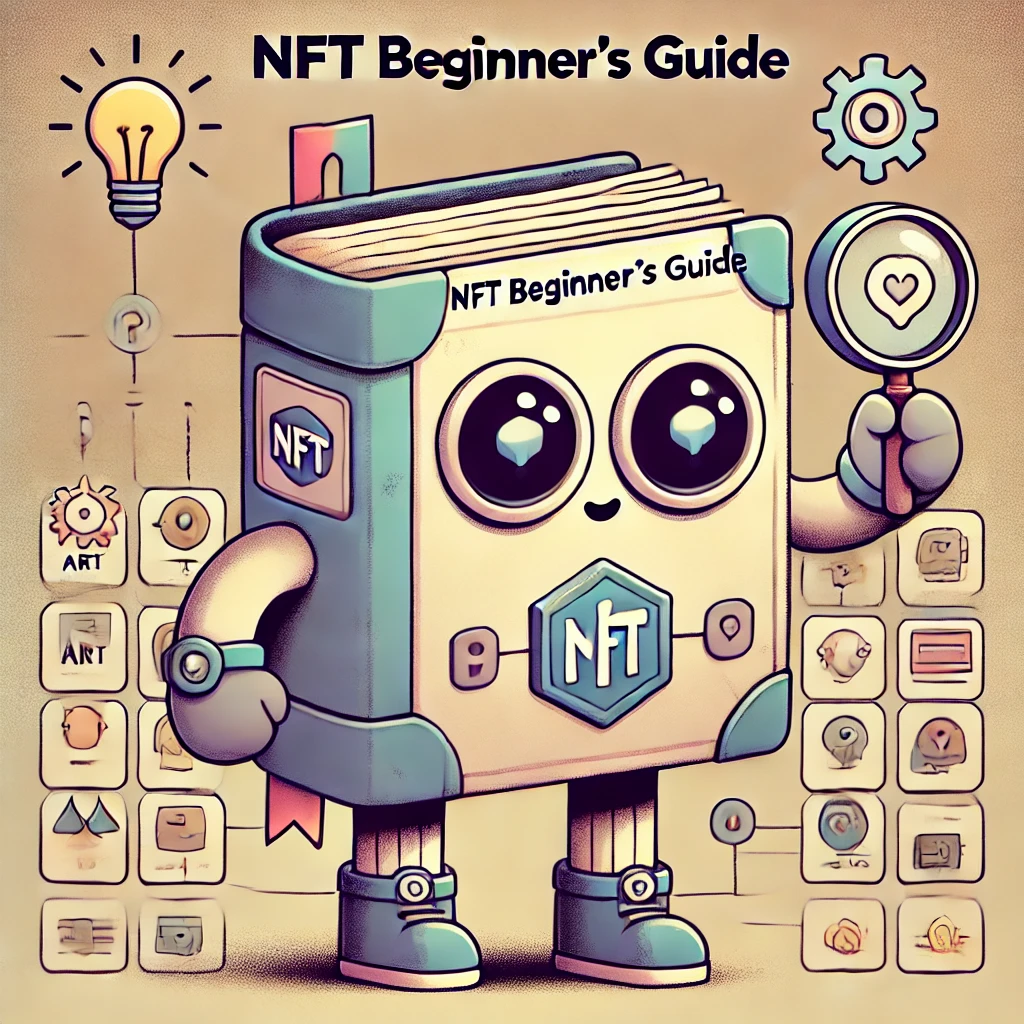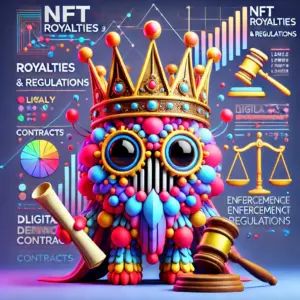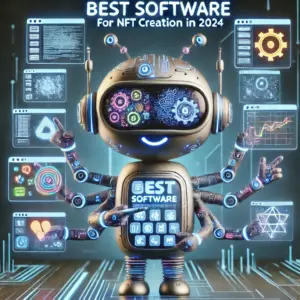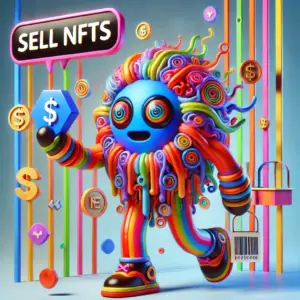In the bustling world of cryptocurrency and blockchain technology, a new term has gained widespread attention: NFTs, or Non-Fungible Tokens. While the initial intrigue may stem from their perceived association with digital art and collectibles, the essence of NFTs lies in their unique ability to represent ownership and authenticity of digital assets on a blockchain. This guide delves into the world of NFTs, explaining their functionality, diverse applications, and potential impact on various industries.
Imagine owning a unique digital asset, a rare virtual item, or a piece of digital art – one that is entirely yours and cannot be replicated. This ownership is what NFTs strive to achieve. They function as digital certificates of authenticity, providing verifiable proof of ownership and provenance for a wide array of digital assets.
The Essence of Non-Fungibility
The term “non-fungible” is crucial to understanding NFTs. It signifies that each NFT is unique and cannot be substituted for another. Unlike fungible assets like fiat currency, where one dollar bill is identical to another, NFTs are distinguishable. This distinctiveness allows each NFT to represent a specific, irreplaceable asset, whether it’s a digital artwork, a virtual collectible, a concert ticket, or even a digital game item.
The Role of Blockchain
The magic behind NFTs lies in their reliance on blockchain technology, which provides a secure and transparent ledger of transactions. When an NFT is created, it is permanently recorded on the blockchain, creating an immutable record of its existence and ownership. This immutability ensures that NFTs are highly resistant to counterfeiting or duplication. The blockchain serves as a public, verifiable record, safeguarding the ownership history and authenticity of every NFT.
The Diverse Applications of NFTs
The realm of NFT applications extends far beyond digital art and collectibles. While these sectors have captured the most attention, NFTs are poised to revolutionize various industries in the future. Let’s explore the diverse applications of NFTs:
Digital Art and Collectibles
NFTs have emerged as a powerful force in the art world, enabling artists to monetize their digital creations through unique ownership tokens. Previously, digital art faced challenges in proving ownership and preventing unauthorized copying. NFTs solve this problem by providing a verifiable record of ownership and authenticity. This has empowered artists to connect directly with collectors, eliminating the need for intermediaries and facilitating transparent transactions.
The NFT market has seen a surge in popularity for digital art collections, with platform like OpenSea becoming major marketplaces for trading and showcasing NFTs. Artists can create NFTs of their works, offering collectors the opportunity to own a unique, verifiable piece of digital art. The value of these NFTs can fluctuate based on market demand, artist reputation, and other factors. NFTs are also transforming the realm of collectibles, enabling digital representations of physical assets like trading cards, stamps, or sports memorabilia to be acquired, owned, and traded on the blockchain.
Gaming
In the rapidly expanding gaming industry, NFTs are revolutionizing the concept of in-game assets. Traditionally, these assets were restricted to specific games and often lacked true ownership rights. NFTs can change this by providing players true ownership of their in-game items, enabling them to trade or sell them independently of the game itself. This opens doors for new economies within games, empowering players to own, trade, and even profit from their virtual possessions.
NFT-based games are becoming increasingly popular, offering players unique experiences and the ability to interact with their virtual assets in innovative ways. NFTs can be used for in-game currency, characters, weapons, skins, and virtual land, creating new avenues for gameplay and monetization. The use of NFTs in gaming promotes transparency, reduces the risk of in-game fraud, and fosters a more equitable and secure gaming environment.
Music and Entertainment
NFTs are transforming the music industry, allowing artists to interact directly with fans in novel ways. Musicians can create NFTs representing songs, albums, concert tickets, or even unique fan experiences. Fans can then purchase these NFTs, gaining exclusive access to content, behind-the-scenes glimpses, or even interactive experiences with their favorite artists.
NFTs are also disrupting traditional ticketing systems, enabling secure, tamper-proof tickets for concerts, sporting events, and other live experiences. This provides enhanced security against ticket scalping and counterfeit tickets, offering a more equitable and fan-friendly ticketing system.
Supply Chain Management
Beyond the realm of digital assets, NFTs are finding applications in traditional industries like supply chain management. NFTs can track the movement and authenticity of physical goods throughout the supply chain, providing transparency and security. This could be used to track products from manufacturing to retail, ensuring authenticity and identifying counterfeit goods.
NFTs can also be used to verify the origin and ethical sourcing of raw materials, helping to promote sustainable practices and ethical consumption. By recording information about the product’s origin, ingredients, and processing methods on the blockchain, NFTs can provide a transparent and tamper-proof record of the product’s journey.
Identity Management
The potential of NFTs in identity management is vast. They can be used to securely store and manage digital identities, providing a verifiable and tamper-proof record of personal information. This can be applied to various sectors, including government identification, online authentication, and access control.
NFTs can be used to create secure and portable digital identity credentials that are verifiable across different platforms and services. This could streamline identity verification processes, reducing fraud and enhancing efficiency.
Real Estate
NFTs are beginning to disrupt the real estate sector by offering new ways to represent and trade property ownership. While traditional real estate transactions involve complex legal processes and paperwork, NFTs can provide a secure, transparent, and efficient alternative. NFTs can be used to represent fractional ownership in properties, enabling investment in real estate with lower barriers to entry.
NFTs can also be used to create digital twins of properties, providing detailed virtual representations that serve as comprehensive information resources for potential buyers and investors. This can enhance the transparency and efficiency of real estate transactions.
Table of Contents:
Understanding NFT Terminology
Navigating the world of NFTs requires familiarity with common terminology. Let’s decode some key terms:
Blockchain
Think of a blockchain as a digital ledger that chronologically records transactions in a secure and transparent manner. Each block in the chain contains a set of transactions, and once a block is added to the chain, it cannot be altered or removed. This immutability makes blockchains ideal for maintaining records of ownership and authenticity, as they are highly resistant to tampering or fraud.
Smart Contract
A smart contract is a self-executing agreement written in code and stored on the blockchain. It automatically enforces the terms of the agreement between parties, eliminating the need for intermediaries and reducing potential for disputes. In the context of NFTs, smart contracts can automate the transfer of ownership, payment processing, and other actions related to an NFT, ensuring smooth and secure transactions.
Mint
“Minting” an NFT refers to the process of creating and registering it on the blockchain. This involves writing the NFT’s data to the blockchain, effectively bringing the NFT into existence. During minting, the creator typically sets the initial price or terms for the NFT. After minting, the NFT enters circulation and can be traded or sold on various NFT marketplaces.
Marketplace
An NFT marketplace is a platform where users can buy, sell, and trade NFTs. These marketplaces provide a central hub for creators to showcase their work and for collectors to explore and acquire NFTs. Popular NFT marketplaces include OpenSea, Rarible, and Nifty Gateway. These marketplaces typically charge fees for transactions, providing incentives for creators and collectors alike.
Gas Fees
Gas fees are transaction fees that are paid to miners on the blockchain for processing transactions. The cost of gas fees can vary depending on the network congestion and the complexity of the transaction. When minting, buying, or selling an NFT, users are required to pay gas fees to execute the transaction on the blockchain.
Metadata
Metadata provides additional information about an NFT, serving as a digital passport that describes its characteristics. This information can include the NFT’s name, description, image, animation, or any other relevant details. Metadata is stored on the blockchain alongside the NFT, ensuring the integrity and accuracy of the information.
The Advantages of NFTs
NFTs offer a compelling set of advantages, making them a transformative technology across various industries.
Ownership and Authenticity
NFTs provide undeniable proof of ownership and authenticity for digital assets, eliminating the risk of counterfeiting or duplication. This gives creators and collectors confidence in the value and provenance of their digital assets.
Transparency and Traceability
The blockchain technology underpinning NFTs ensures transparency and traceability for digital assets. The complete history of the NFT, including its creation, ownership transfers, and any other relevant information, is permanently recorded on the blockchain, making it readily accessible for verification.
New Revenue Streams
NFTs create exciting new revenue streams for creators in various industries. Artists can monetize their digital work, musicians can directly engage with fans, and game developers can empower players with ownership of in-game assets. The ownership aspect of NFTs opens doors for new forms of monetization, fostering innovation and creativity.
Decentralization
NFTs are built on decentralized blockchain technology, meaning they are not controlled by any single entity. This eliminates reliance on intermediaries and provides increased autonomy for creators and collectors. Decentralization empowers individuals and enables direct interaction, reducing reliance on centralized authorities and platforms.
The Risks and Challenges of NFTs
While NFTs offer numerous benefits, it’s essential to acknowledge the potential risks and challenges associated with this emerging technology.
Volatility and Speculation
The NFT market, like any emerging market, can be subject to high volatility and speculation. The value of NFTs can fluctuate drastically based on market trends, hype, and other factors. While this volatility can create opportunities for investors and collectors, it also poses risks for those who do not fully understand the market dynamics.
Environmental Impact
Certain blockchains, particularly those employing Proof-of-Work consensus mechanisms, can consume significant energy. The energy consumption associated with minting, trading, and other transactions on these blockchains can raise environmental concerns. Efforts are being made to address these concerns through the development of more energy-efficient blockchains and advancements in sustainable mining practices.
Security Concerns
While blockchain technology is designed to be secure, the NFT ecosystem is still evolving and vulnerabilities may exist. Users should be vigilant about potential scams, phishing attempts, and other security risks. It is crucial to choose reputable platforms and take appropriate security measures to protect their digital assets.
Regulatory Challenges
The rapidly evolving nature of NFTs poses regulatory challenges for governments and financial institutions. Ensuring consumer protection and combating fraud within the NFT market are key areas of concern. Clear regulatory frameworks are needed to provide a stable and predictable environment for NFT development and adoption.
The Future of NFTs
The future of NFTs holds immense potential, with projections pointing to widespread adoption across various sectors. As blockchain technology matures and regulatory frameworks evolve, NFTs are poised to play an increasingly significant role in our digital lives.
Integration with Existing Industries
NFTs are expected to integrate seamlessly with existing industries, enhancing existing processes and enabling new business models. From supply chain management to ticketing and digital identity, NFTs are predicted to bring greater transparency, efficiency, and security to a wide range of sectors.
The Metaverse
The rise of the metaverse, a collaborative virtual environment, creates a fertile ground for NFT adoption. NFTs can be used to represent virtual land, assets, and experiences within these immersive virtual worlds. The ownership and authenticity provided by NFTs are crucial for establishing a vibrant and engaging metaverse economy.
Decentralized Finance (DeFi)
NFTs are expected to play a vital role in the decentralized finance (DeFi) ecosystem. Their unique properties can be leveraged to create new types of financial products and services. NFTs could be used to represent collateral in decentralized lending platforms, facilitate the creation of fractionalized ownership in assets, and enable novel forms of financial interactions within the DeFi space.
Conclusion
NFTs are a revolutionary technology that is transforming the way we think about digital ownership and authenticity. Their ability to represent and verify ownership of unique digital assets has opened up a world of possibilities for artists, collectors, gamers, and businesses alike. As the NFT ecosystem continues to evolve, we can expect to see even more innovative and transformative applications of this technology in the years to come. It’s crucial to approach NFTs with a balanced perspective, weighing their potential benefits against the risks and challenges. By fostering responsible innovation and understanding the complexities of this evolving space, we can unlock the full potential of NFTs to create a more secure, transparent, and equitable digital world.
FAQs
Are NFTs a Good Investment?
The potential returns from investing in NFTs are highly speculative and can be volatile. The value of NFTs is influenced by various factors, including market demand, artist reputation, and community sentiment. It’s essential to conduct thorough research, understand the risks involved, and only invest what you can afford to lose. Investing in NFTs should be considered a high-risk, high-reward venture, and it’s crucial to approach it with caution.
How do I Buy an NFT?
To buy an NFT, you’ll need to:
- Create a digital wallet: You’ll need a wallet to store your NFTs and interact with the blockchain.
- Choose a marketplace: Popular platforms like OpenSea, Rarible, and Nifty Gateway offer a wide selection of NFTs.
- Purchase cryptocurrency: Most marketplaces require you to buy cryptocurrency, such as Ethereum, to purchase NFTs.
- Find an NFT: Browse the marketplace and find an NFT that interests you.
- Place a bid or purchase: Depending on the marketplace, you can place a bid or purchase the NFT outright.
- Complete the transaction: The transaction will be executed on the blockchain and recorded in your digital wallet.
Are NFTs Legal?
The legality of NFTs is still being debated in many jurisdictions. While NFTs themselves are not illegal, their use in certain contexts may be subject to regulations. It’s crucial to stay informed about the legal framework surrounding NFTs in your specific region. The use of NFTs for activities such as financial transactions, asset ownership, or intellectual property rights may fall under existing or emerging regulations. However, NFTs themselves are not inherently illegal.
What are the different types of NFTs?
NFTs come in various forms, each with distinct characteristics and applications. Here are a few common types of NFTs:
- Digital Art: NFTs can represent digital artworks, whether images, videos, audios, or interactive experiences.
- Collectibles: These NFTs can represent digital versions of physical collectibles, such as trading cards, stamps, or sports memorabilia.
- Gaming Items: NFTs are used in gaming to represent in-game assets, such as characters, weapons, skins, or virtual land.
- Music and Entertainment: These NFTs can represent songs, albums, concert tickets, or unique fan experiences.
- Domain Names: NFTs can be used to represent ownership of domain names, offering a decentralized and secure alternative to traditional domain registration.
- Utility NFTs: These NFTs provide access to specific services or benefits, like exclusive membership in a community or access to a particular event.
What is the Future of NFTs?
The future of NFTs looks promising, with the technology expected to influence various industries. Here are some key areas where NFTs are anticipated to play a significant role:
- Metaverse: NFTs are poised to become integral to virtual economies within the metaverse, representing virtual land, assets, and experiences.
- Gaming: NFTs are expected to revolutionize the gaming industry, providing players with true ownership of in-game assets and enabling new forms of gameplay and monetization.
- Real Estate: NFTs can be used to represent property ownership, facilitating more transparent and efficient transactions in the real estate sector.
- Supply Chain Management: NFTs can enhance supply chain transparency, traceability, and authenticity by providing an immutable record of the product’s journey.
- Identity Management: NFTs hold potential for secure and portable digital identity solutions, streamlining verification processes and reducing fraud.
- Decentralized Finance (DeFi): NFTs are expected to play a role in the DeFi ecosystem, enabling new financial products and services.






